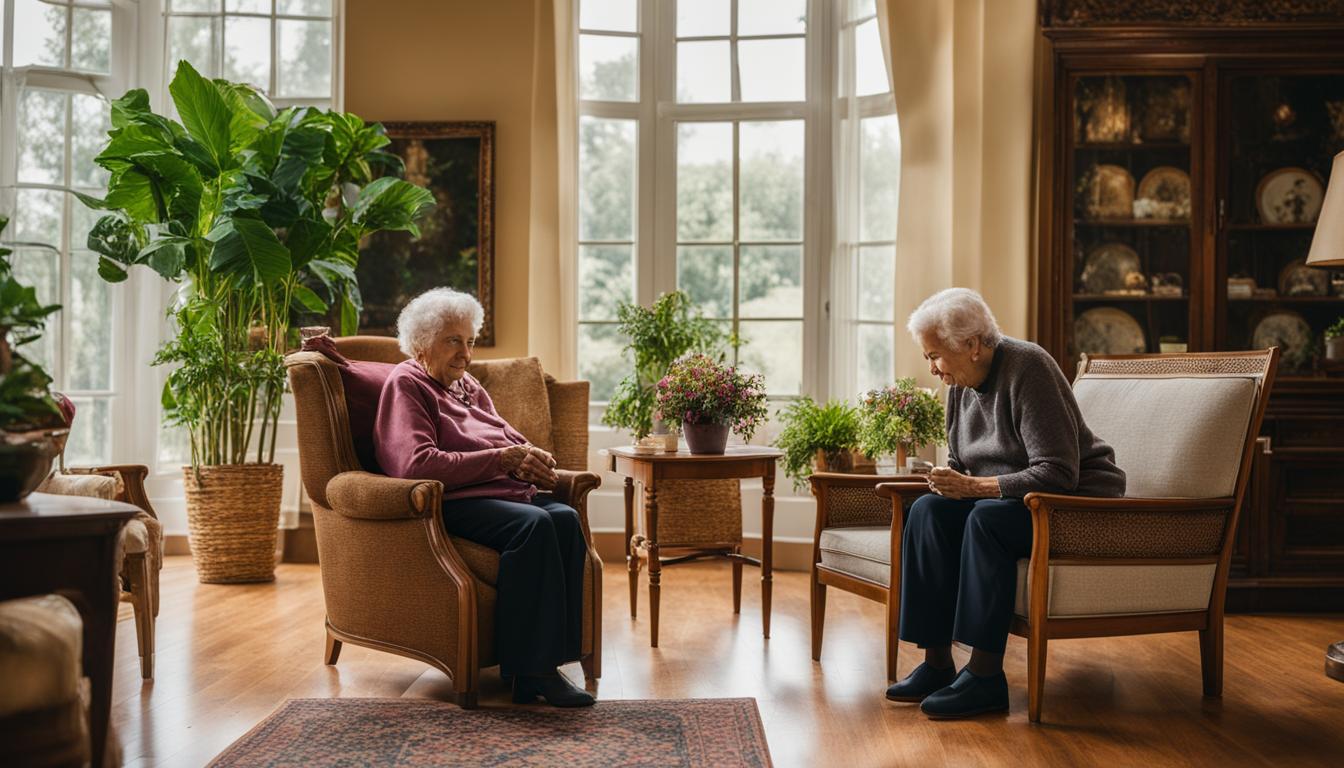Experience Quality Living with Private Aged Care
Introduction
As a devoted and caring individual, I have taken it upon myself to delve into the world of private aged care in Mexico for my retired parents living in Los Angeles. Recognizing their desire for a comfortable and fulfilling life during their golden years, I embarked on this journey to ensure that they receive the best possible care and support. With Mexico’s reputation for its warm climate, rich culture, and affordable healthcare options, I am determined to explore various aspects of private aged care facilities, medical services, and lifestyle offerings that could potentially enhance their quality of life.
Thank you for reading this post, don't forget to subscribe!
My research aims to uncover the finest retirement communities, specialized healthcare providers, and recreational activities tailored to their preferences, enabling them to embark on an exciting and fulfilling chapter of their lives. This exploration not only reflects my deep love and concern for my parents but also showcases my desire to provide them with a retirement haven filled with utmost comfort, security, and opportunities for personal growth.
Private aged care services offer seniors personalized and high-quality care in a comfortable and dignified environment. Whether in senior living facilities, assisted living homes, retirement communities, or long-term care facilities, private aged care ensures that seniors receive the necessary support and assistance tailored to their individual needs.
Choosing private aged care enables seniors to experience enhanced quality of life. It provides them with a sense of belonging, security, and the opportunity to age gracefully while receiving the care they require. With a focus on individualized attention and specialized services, private aged care providers prioritize the well-being and dignity of seniors in their golden years.
Key Takeaways:
- Private aged care services offer personalized and high-quality care for seniors.
- Seniors can experience enhanced quality of life through private aged care.
- Private aged care providers prioritize the well-being and dignity of seniors in their golden years.
- Choosing private aged care ensures that seniors receive the support and assistance tailored to their individual needs.
- Private aged care settings include senior living facilities, assisted living homes, retirement communities, and long-term care facilities.
The Importance of Staffing and Leadership in Private Aged Care
When it comes to private aged care, staffing and leadership play a crucial role in ensuring the quality of care provided to residents. Adequate staffing levels are essential to meet the needs of elderly individuals and provide prompt and efficient services. Insufficient staffing can result in delays in providing essential care, such as assistance with toileting or responding to residents’ needs in a timely manner.
Effective care home leadership is equally important in creating a positive work environment for carers and empowering them to deliver excellent care. Through effective leadership, care providers can ensure that the staff is well-trained, motivated, and equipped with the necessary skills to meet the diverse needs of residents. By valuing and supporting the carers, private aged care services can enhance the overall experience and well-being of residents.
In addition to staffing and leadership, the quality of care is also influenced by the commitment of elderly care providers. These providers should prioritize the well-being of residents and strive to provide personalized care that meets their individual needs. By maintaining a resident-centered approach, private aged care services can ensure that each resident receives the attention, support, and assistance they require.
Effective care home leadership is essential in creating a positive work environment for carers and empowering them to deliver excellent care.
Overall, staffing levels, effective care home leadership, and the commitment of elderly care providers are all vital components in delivering quality care in private aged care settings. By prioritizing these aspects, private aged care providers can create an environment where residents receive the individualized care and support they need to thrive.
| Key Factors | Importance |
|---|---|
| Staffing | Ensures prompt and efficient care delivery |
| Leadership | Creates a positive work environment for carers |
| Commitment | Prioritizes the well-being of residents |
Meeting the Emotional and Social Needs of Residents in Private Aged Care
Ensuring the well-being of residents in private aged care goes beyond addressing their physical needs. It is essential to create an environment that caters to their emotional and social requirements. By promoting social engagement and cultivating meaningful relationships, private aged care providers can enhance the overall quality of life for their residents.
Social activities play a vital role in meeting the emotional and social needs of residents. These activities provide opportunities for interaction, fostering a sense of belonging and connection within the community. From group outings and recreational events to hobby clubs and support groups, residents can engage in activities that align with their interests, creating a fulfilling and enjoyable social environment.

“Being part of a social community in private aged care has made a significant impact on my well-being. I have formed deep friendships and have a network of people who genuinely care about each other. It’s like having a second family.”
Meaningful relationships between residents and carers are also crucial in private aged care. Carers who take the time to develop personal connections with residents can better understand their needs and provide compassionate support. Through regular conversation and attentive listening, carers can create a warm and trusting environment, where residents feel valued and understood.
Promoting Social Engagement: Activities and Programs
In private aged care, various activities and programs can promote social engagement and foster meaningful relationships. Some examples include:
- Arts and crafts workshops
- Musical performances and sing-alongs
- Bingo and trivia nights
- Book clubs and discussion groups
- Gardening clubs
- Intergenerational programs with local schools
These activities provide opportunities for residents to interact, share experiences, and form connections with their peers and carers. They not only enhance social engagement but also contribute to the overall well-being and happiness of residents in private aged care.
Conclusion
Meeting the emotional and social needs of residents is paramount in private aged care. By promoting social engagement, cultivating meaningful relationships, and providing a range of activities and programs, private aged care providers can create a vibrant and supportive community for their residents. By prioritizing resident well-being, private aged care services ensure that seniors receive the holistic care they need to thrive in their golden years.
Enhancing the Physical and Mental Health of Residents in Private Aged Care
When it comes to private aged care services, prioritizing the physical and mental health of residents is paramount. By focusing on promoting physical activity, providing mental well-being support, and addressing the specific needs of residents with dementia, care providers can enhance the overall quality of life for older adults.
Physical Activity: Encouraging a Healthy Lifestyle
Engaging residents in regular physical activity has numerous benefits for their well-being. Whether it’s through group exercises, walks in outdoor spaces, or tailored exercise programs, physical activity helps maintain mobility, strength, and flexibility. It also contributes to improved cardiovascular health, reduced risk of falls, and enhanced overall cognitive function.
Table: Benefits of Physical Activity in Private Aged Care
| Benefits | Explanation |
|---|---|
| Improved cardiovascular health | Regular physical activity helps maintain a healthy heart. |
| Enhanced cognitive function | Exercise stimulates brain activity and can improve memory and cognition in older adults. |
| Reduced risk of falls | Physical activity strengthens muscles and improves balance, lowering the risk of falls and associated injuries. |
Mental Well-being: Supporting Emotional Health
In addition to physical activity, private aged care services should prioritize the mental well-being of residents. Creating an environment that promotes social engagement, meaningful relationships, and opportunities for personal growth can greatly contribute to residents’ mental health. Providing access to counseling services, support groups, and activities that stimulate cognitive function can also help maintain mental acuity and overall well-being.
It’s important to emphasize that mental well-being is just as vital as physical health. By fostering a positive and supportive environment, we can enhance the overall quality of life for residents in private aged care.”
Dementia Care: Catering to Specific Needs
Private aged care providers should also address the specific needs of residents with dementia. Offering dementia-specific training for carers can improve their understanding of the condition and equip them with the necessary skills to provide compassionate and effective care. Creating a dementia-friendly environment, implementing memory-enhancing activities, and ensuring consistency in daily routines can help minimize confusion and agitation, promoting a sense of security and well-being for residents with dementia.
By prioritizing physical activity, supporting mental well-being, and catering to the specific needs of residents with dementia, private aged care services can provide a holistic approach to care. This comprehensive focus on both the physical and mental health aspects empowers older adults to lead fulfilling lives in a caring and supportive environment.

Creating a Homelike Environment and Respectful Care in Private Aged Care
When it comes to private aged care, creating a homelike environment is essential in ensuring that residents feel comfortable, safe, and respected. By adopting person-centered care approaches, private aged care providers can prioritize the individual needs and preferences of residents, promoting a sense of dignity and respect.
Person-centered care involves tailoring care plans and services to meet the unique requirements of each resident. It recognizes that residents have their own histories, interests, and preferences that should be considered in their day-to-day care. By involving residents in decision-making and valuing their input, private aged care providers create an empowering atmosphere that promotes autonomy and independence.
“The homelike environment in our private aged care facility has been instrumental in enhancing the overall well-being of our residents. By focusing on their individuality and treating them with dignity and respect, we have witnessed a positive transformation in their happiness and quality of life.” – Jane Smith, Director of Care
Prioritizing the Physical Environment
Creating a homelike environment goes beyond providing the necessary amenities and care services. It also involves paying attention to the physical aspects of the facility. Private aged care providers should ensure that resident rooms are aesthetically pleasing, with comfortable furnishings and personal touches that make them feel like home. Privacy should be respected, and communal areas should be inviting and designed to encourage social engagement among residents.
Furthermore, maintaining a clean and well-maintained environment is crucial in upholding resident dignity and well-being. Ensuring that common areas are tidy and free from clutter creates a pleasant living environment that residents can take pride in.
Respectful Care Practices
Respectful care practices are at the core of creating a homelike environment in private aged care. This includes treating residents with kindness, compassion, and empathy. Caregivers should take the time to build meaningful relationships with residents, actively listening to their needs and concerns, and responding with empathy.
Respecting residents’ choices and promoting their independence is also vital. Encouraging them to participate in daily activities, allowing them to make decisions about their care, and respecting their privacy and personal boundaries are all essential elements of creating a respectful care environment.
Conclusion
A homelike environment and respectful care are crucial in private aged care settings. By adopting person-centered care approaches, prioritizing the physical environment, and implementing respectful care practices, private aged care providers can create an atmosphere that promotes the well-being, dignity, and happiness of their residents.
Valuing Resident Feedback and Continuous Improvement in Private Aged Care
Listening to resident feedback and continuously striving for improvement are integral aspects of providing quality private aged care services. By actively seeking input from residents and their families, private aged care providers can gain valuable insights into the needs and preferences of their residents, allowing them to make necessary adjustments and enhancements to their care practices.
Resident feedback serves as a powerful tool for quality management in private aged care. It provides a direct line of communication between residents and care providers, enabling the identification of areas that require improvement and highlighting the aspects of care that are working well. By embracing and acting upon resident feedback, private aged care providers can create a culture of continuous improvement and ensure that their services meet the evolving needs and expectations of their residents.
“Resident feedback is a crucial component of quality management in private aged care. By actively listening to the experiences and suggestions of residents, providers can make meaningful changes that enhance the overall care experience. Valuing resident feedback demonstrates a commitment to resident-centered care and fosters a sense of empowerment and ownership among residents.”
In order to effectively utilize resident feedback for continuous improvement, private aged care providers should establish transparent and accessible feedback channels. This could include regular surveys, suggestion boxes, meetings with residents, and open dialogue sessions. The information gathered through these channels should be carefully analyzed and used to inform decision-making processes, shape policies, and drive positive change within the organization.
Engaging Residents in Quality Management
Engaging residents in the quality management process is a key strategy for private aged care providers. By involving residents in the evaluation and improvement of care services, providers can empower residents to actively participate in decision-making and contribute to the overall improvement of their own care experience. This can be achieved through resident councils or committees, where residents have the opportunity to share their perspectives, voice concerns, and collaborate with staff members to implement changes.
Table: Resident Feedback Channels
| Feedback Channel | Description |
|---|---|
| Satisfaction Surveys | Regular surveys conducted to gather feedback on various aspects of care, such as staff responsiveness, food quality, and cleanliness. |
| Suggestion Boxes | Physical or digital boxes where residents can submit suggestions, concerns, or compliments anonymously. |
| Resident Meetings | Regular meetings held between residents and care providers to discuss issues, share ideas, and provide feedback. |
| Open Dialogue Sessions | Structured sessions where residents and care providers come together to engage in open and honest conversations about improving care services. |
By valuing resident feedback and actively embracing continuous improvement, private aged care providers can ensure that their services consistently meet the needs and expectations of their residents. This commitment to quality management fosters a culture of excellence and promotes the well-being and satisfaction of residents in private aged care.

Conclusion
Private aged care services offer a unique opportunity for seniors to experience top-quality living with personalized and tailored care. By prioritizing experienced quality of care, private aged care providers ensure that seniors receive the support and assistance they need while enjoying a comfortable and dignified environment.
From staffing and leadership to emotional and social well-being, private aged care services excel in providing comprehensive care. By placing importance on adequate staffing levels and effective leadership, residents can benefit from a positive work environment and prompt delivery of essential services. Additionally, addressing emotional and social needs through engagement and meaningful relationships enhances the overall well-being and satisfaction of residents.
Physical and mental health play crucial roles in the care provided to residents. Encouraging physical activity, providing mental health support, and catering to specific needs of residents with dementia contribute to their overall well-being and quality of life. Creating a homelike environment where residents feel respected and involved in decision-making further enhances their care experience.
Lastly, private aged care providers value resident feedback and continuously strive for improvement. By actively seeking input, maintaining open communication with families, and implementing changes based on feedback, providers can shape policies and protocols that enhance the quality of care and services offered.
In conclusion, private aged care services offer an exceptional experience of quality living through personalized and tailored care. By encompassing all aspects of care, from staffing and leadership to emotional well-being, physical health, homelike environments, and continuous improvement, private aged care providers prioritize experienced quality of care to ensure the well-being and dignity of seniors in their golden years.
FAQ
What are private aged care services?
Private aged care services provide personalized and high-quality care for seniors in various settings, such as senior living facilities, assisted living homes, retirement communities, and long-term care facilities.
Why is staffing important in private aged care?
Sufficient staffing levels are crucial to ensure prompt response to residents’ needs and the provision of essential services, such as assistance with toileting. Adequate staffing also enhances the overall quality of care.
How does effective care home leadership impact private aged care?
Effective care home leadership creates a positive work environment for carers, empowering them to deliver excellent care. It plays a crucial role in enhancing the overall experience and well-being of residents.
How do private aged care services address the emotional and social needs of residents?
Private aged care services create a supportive and engaging environment that fosters meaningful relationships among residents and carers. This promotes a sense of belonging and purpose, enhancing overall well-being and satisfaction.
How do private aged care services prioritize the physical and mental health of residents?
Private aged care services encourage regular physical activity, provide appropriate mental health support, and address specific needs of residents with dementia. Engaging in activities, offering opportunities for exercise, and creating a stimulating environment contribute to the overall well-being and quality of life of residents.
How do private aged care services create a homelike environment?
Private aged care services adopt person-centered care approaches, treat residents with dignity and respect, and involve them in decision-making. Attention to physical aspects such as room aesthetics and privacy, as well as promoting independence and choice in daily activities, contribute to a positive and empowering atmosphere.
Why is resident feedback important in private aged care?
Resident feedback helps private aged care providers continuously improve their services. By regularly seeking input from residents, maintaining open communication with families, and acting on feedback, providers can make meaningful changes in care practices and service delivery.

